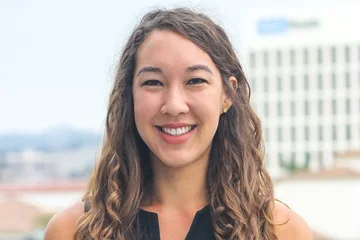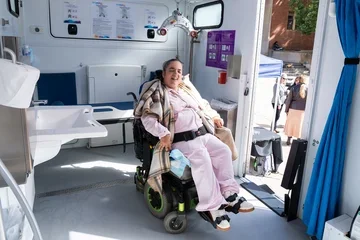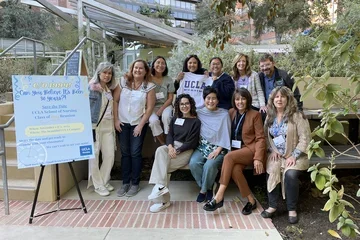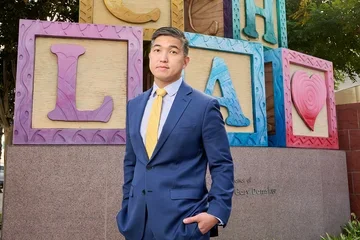HEALTHY MIND. HEALTHY LIFE.

WHEN LECTURER BARBARA DEMMAN, RN, MSN, ACNP, CNS INTRODUCED A SIMPLE MINDFULNESS EXERCISE AT THE BEGINNING OF HER CLASS, THE STUDENT RESPONSE WAS IMPRESSIVE.
“We start the class with a little deep breathing, focusing on the sounds around us, what thoughts are occurring, and just a few moments of quiet observation,” said Demman, assistant director of prelicensure programs at the UCLA School of Nursing. Once that began, it was amazing how many students welcomed this exercise stating “it really helped lower stress levels, produced a sense of calm, and helped me arrived to class on time — early 8 am on Friday mornings.” And if a student was late, the first thing they often wanted to know was whether they had “missed the breathing exercise.”
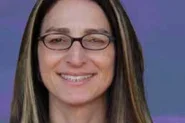
…INSTEAD, DEMMAN DOVE INTO RESEARCH. WHAT SHE DISCOVERED WAS THE POWER IN THE GROUP OF TECHNIQUES THAT ARE NOW REFERRED TO AS MINDFULNESS BASED INTERVENTIONS.
- Barbara Demman, RN, MSN, ACNP, CNS
The positive response to those five minutes of calm and focus supports an age-old principle—that mental and emotional health are tied to wellbeing. Bolstered by decades of research and scores of studies, the concept is now—some say finally—gaining real traction. The state of our mental and emotional health drives how we feel and how we act. It informs the depth and quality of our personal relationships, and can even affect an individual’s physical condition.

“THEY HAD SADNESS, DEPRESSION AND ANXIETY, AND WITHOUT THE DRUGS THERE WAS NOTHING TO MASK
THOSE FEELINGS,” GLASNER SAID. “THIS WOULD OFTEN CAUSE THEM TO DROP OUT OF TREATMENT EARLY-ON.”
- Suzette Glasner, Ph.D.
At UCLA’s School of Nursing, researchers are successfully putting these principles into practice. Drawing on deep expertise, they’ve created unique and sometimes surprising programs to help patients deal with their mental health challenges. At the same time, these UCLA nurses are working to help their patients address the stigma that so often surrounds issues of mental illness.
For Psychologist Suzette Glasner, Ph.D., a new faculty member at the School, the importance of the mind-body balance plays out every day. As a licensed clinical psychologist, Glasner’s work focuses on people who are addicted to stimulants, including cocaine and methamphetamine.
As her patients would struggle through the early weeks and months of sobriety, Glasner realized that for them, feeling out of control, whether mentally or emotionally, was often intolerable.
“They had sadness, depression and anxiety, and without the drugs there was nothing to mask those feelings,” Glasner said. “This would often cause them to drop out of treatment early-on.”
When she first broached the idea of using mindfulness techniques to help these patients, Glasner was met with skepticism. But with a 50-minute program tailored to the unique needs of her patient population, including meditation, guidance on how to recognize drug-use triggers, as well as other coping skills, Glasner saw measurable progress.
“They learned that you can feel sad or anxious or even desperate and it doesn’t have to control your actions,” she said. “They were now equipped with a way of managing discomfort that let them see light at end of the tunnel, and that would help them stick with treatment.”
The challenge for MarySue Heilemann, Ph.D., RN, associate professor at the UCLA School of Nursing, is attracting patients to therapy. With a focus on managing depression and anxiety among Latinas, Heilemann must first help her patients overcome the cultural stigma attached to mental health issues.
“The women I work with are hard-working and dedicated, they’re busy moms, very accountable to their family members,” Heilemann said. “To them, getting mental health care feels both selfish and indulgent. If it’s not helping the family first, then it isn’t something that they will easily do.”
Heilemann was able to circumvent these taboos by taking some lessons from telenovelas and transmedia. She used non-traditional tools women found attractive like digital storytelling, blog posts, and interactive videos. She also offered one-on-one therapy sessions held in neutral settings, like a childcare center, with a nurse-therapist.
“We found when they took part in our program, not only was there a significant drop in depression and a significant increase in resilience, these gains held for one year,” Heilemann said.

“TO THEM, GETTING MENTAL HEALTH CARE FEELS BOTH SELFISH AND INDULGENT. IF IT’S NOT HELPING THE FAMILY FIRST, THEN IT ISN’T SOMETHING THAT THEY WILL EASILY DO.”
- MarySue Heilemann, Ph.D., RN
That same stigma, which makes mental health issues a challenge to treat in some African-American communities, is the focus of work now being done by Kia Skrine Jeffers, Ph.D., RN, a nursing postdoctoral fellow in the UCLA National Clinician Scholars Program and alumna of the School of Nursing’s Ph.D. and MECN programs.
As a nurse with an active Screen Actors Guild card, Skrine Jeffers is deploying the powerful tools of her former career in the service of her current one. With a grant from the California Arts Council, the former actor is writing and producing a play that will help to bridge cultural gaps.
“I have always been interested in health and lifestyle issues and wanted to do more to help people,” Skrine Jeffers said of her professional detour from Hollywood to health care. “I took what was supposed to be a hiatus from acting to become a nurse. But, when I saw the huge disparities in health and health care, particularly among certain racial groups, I felt a responsibility to do even more beyond the bedside.”
Her current project, done in partnership with UCLA’s Center for Health Services and Society, and Healthy African American Families, will take data collected from a five-year study on depression and social issues in minority communities, and translate it into a participatory theater production. Instead of dry facts and figures, audiences will watch and join in as actors bring depth and life to mental health issues.
“We want to reach people in a very personal way,” Skrine Jeffers said. “We’re going to tell everyday stories about what it’s like to live with depression. Our hope is that people will see themselves or their loved ones in the stories, and will feel less stigmatized when deciding whether or not to seek or encourage someone to get help.”

HER CURRENT PROJECT, DONE IN PARTNERSHIP WITH UCLA’S CENTER FOR HEALTH SERVICES AND SOCIETY, AND HEALTHY AFRICAN AMERICAN FAMILIES, WILL TAKE DATA COLLECTED FROM A FIVE-YEAR STUDY ON DEPRESSION AND SOCIAL ISSUES IN MINORITY COMMUNITIES.
- Kia Skrine Jeffers, Ph.D., RN
That’s something that Barbara Demman, whose weekly mindfulness meditations have been such a hit, knows a bit about.
In 2008, she recognized that the sleeping problems she had begun to experience, along with feelings of stress and dread, and the lack of joy and fulfillment in her work as a nurse were, in fact, symptoms of burnout.
“When I asked some of my colleagues what to do, they had no sustainable suggestions,” Demman said. “A lot of the ideas were just to take a vacation or go hit happy hour.”
Instead, Demman dove into research. What she discovered was the power in the group of techniques that are now referred to as mindfulness based interventions. Along with her husband, an emergency room physician who has had his own brush with burnout, Demman created an eight-week program to reduce stress and restore wellbeing.
“I had been a nurse for 13 years by the time I felt burned out, and there had not been any education on that phenomenon,” Demman said. “I realized that here we are, teaching all of our nursing students how to be an excellent nurse, but not teaching them how to take care of themselves in the stresses of the job.”
To remedy that, Demman is increasingly focused on introducing mindfulness, as well as the integration of mind and body awareness, to nurses, nursing students, and all individuals who take on the challenging role of caregiver. That those mere five minutes at the start of her weekly class could make a difference in a measurable way is simply more proof of the integral mind-body connection.
“A healthy mind and a healthful life—I honestly don’t think you can have one without the other,” Demman said.
PEERS LENDING AN EAR
Schools are increasingly recognizing the important role social and emotional factors can play in academic success. “When a student needs help, they don’t always need psychotherapy,” said Andrew Leuchter, M.D., a psychiatrist with the Semel Institute. “Sometimes students need an empathetic ear, someone who can help them clarify their thinking and guide them to finding a solution.”
Enter the idea of peer counseling. Peer counselors are students trained to provide additional resources to other students (or peers) as they navigate difficult decisions, points of crisis, or everyday aspects of student life. Working with the UCLA Division of Student Affairs, Leuchter introduced a pilot program to train a few health science students as peer counselors.
Four students responded, including two from nursing. Allyza Afable, now a 4th year bachelor’s student was one of the nursing students who responded. “ I saw it as a rewarding opportunity to talk to other individuals—particularly students like me—in a counseling setting and have experienced psychiatrists and therapists guide me along in that journey.”
The students trained with the psychiatrists and therapists conducting the program and after a few weeks, began meeting with students seeking counseling.
“I do not guide the student during our sessions,” said Afable. “Instead the student guides me into their mind and allows me to be with them in their thoughts and feelings. They were in the driver’s seat and I was simply there to listen, inquire, and provide that empathetic listening space.”
Leuchter welcomed the strong presence from nursing. “Nursing students are caring and committed individuals. We found they are exceptionally strong in helping students in need.”
The good news is that the pilot was in a success and will continue in the Fall. “There is a real need for a program like this,” added Leuchter. “For students interested in a mental health career, it is a terrific educational experience.”
Afable agreed. “I highly recommend experiencing this amazing opportunity either as a peer counselor or a counselee.”
